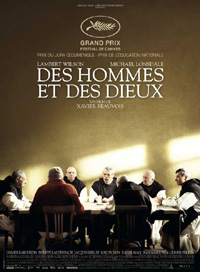Mission: Impossible — Ghost Protocol
Rise of the Planet of the Apes
Film Reviews from 2010
Film Reviews
from 2009
Film Reviews from 2008
Film
Reviews from 2007
Film Reviews
from 2006
Of Gods and Men
“Of Gods and Men” tells the remarkable true story of a small Trappist monastery of French monks in Algeria in 1996. The monks live in peace and harmony with their Moslem neighbors. The monks operate a health clinic for the area, and treat many every day with care and compassion. Abbot Christian is very knowledgeable and respectful of the Koran and the Moslem traditions. In the mid-’90s, violence was exploding in the region. Extremist Moslem terrorists were creating havoc, targeting foreigners and non-Moslems. The film’s only violent moment shows the terrorists brutally attacking a group of Croatians. The repressive Algerian military cracks down on them. The Algerians still resent the presence of the French, their longtime colonizers. The monks find their very existence threatened. Both sides counsel them to leave the area and return to France. In chapter, the nine monks discuss the situation among themselves. At first there is no consensus among them. Some are set on remaining, others believe they should leave. Still others feel that they have not made a decision. They need more time to think, discuss, and pray. Eventually the monks come to a consensus to remain where they are. They know that their decision to remain is a virtual death sentence. Even so, they believe that the presence of the monastery as a place of peace, prayer, and service to their neighbors, is a value that must be preserved. To leave would be a victory for those who advocate violence and force. “Of Gods and Men” captures the rhythm of monastic life beautifully. The monks are often shown gathered in prayer and silence, chanting the psalms and celebrating the Eucharist. The soundtrack consists almost exclusively of chanted psalms, sung beautifully. The monks farm the land, go to market, cook and clean, and discuss the issues in their lives. They preach by the Gospel by the fidelity to their monastic life. The clinic treats anyone, even one of the wounded terrorists who is brought to the monastery. However, they refuse to give into the terrorists’ demands to give them all their medicines when they barge into the monastery on Christmas Eve. One of the great accomplishments of the film is to make the monks so human. They laugh and cry and, even, in one scene, curse. They become angry and increasingly worry about their safety. They miss their families at home, and wonder if they will ever see them again. They can be cranky. Some are brave when threatened, others hide under their beds. In one moving scene, the monks are praying in the chapel when they hear a military helicopter flying low over the monastery. Believing that this is their time to die, they join together physically, facing the window, singing and preparing to die. In another great scene, the monks have their final supper together. The camera shows them each as they eat and drink as they listen to Tchaikovsky’s Swan Lake. They seem to know that it is their own Last Supper. The significance of the moment is not lost upon them, or the viewer. As they live, so they prepare to die. They go about their lives as usual, but with an added intensity, knowing that every day, every moment, might be their last. Every noise, every knock at the door may be the end for them. They go about their lives with tremendous dignity. I thought about missionaries and early Christians whose very life together was a threat to the prevailing culture. I also thought how our lives can be “Holy Preaching,” when lived faithfully and intentionally. I know how easy it is to take my religious life for granted. After experiencing this film, I hope not take it for granted again. After a successful run in Europe where it has won many awards, “Of Gods and Men” has been played in limited release in the United States for about two months. It is now beginning to go into wider release. I think everyone who reads this review would appreciate the profound experience of this film. I hope to see it again while during its theatrical run, and know that I’ll be adding it to my personal library when it becomes available on DVD. There is much food for reflection here on the theology and spirituality of religious life. Tom Condon, OP |



 What a profound experience I had watching this excellent new French film during Holy Week! I usually cringe when I hear about a new movie about religious life or priesthood. How will the filmmakers make us look either like idiots or predators or totally irrelevant people this time? I am very pleased to announce that the makers of “Of Gods and Men” have gotten religious life right, as much as any movie in memory has. Director Xavier Beauvois, who also co-wrote the film, along with Etienne Comar, deserve great praise for their accomplishment.
What a profound experience I had watching this excellent new French film during Holy Week! I usually cringe when I hear about a new movie about religious life or priesthood. How will the filmmakers make us look either like idiots or predators or totally irrelevant people this time? I am very pleased to announce that the makers of “Of Gods and Men” have gotten religious life right, as much as any movie in memory has. Director Xavier Beauvois, who also co-wrote the film, along with Etienne Comar, deserve great praise for their accomplishment.